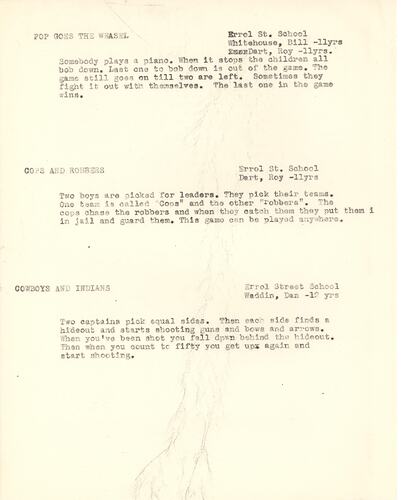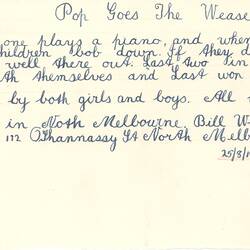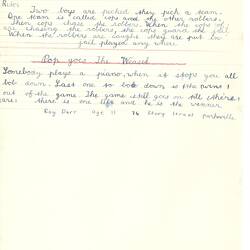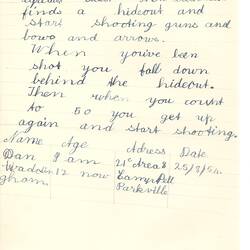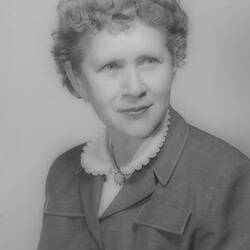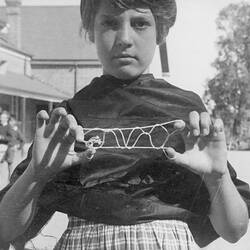Summary
Game type: 'Pop goes the Weasel' (elimination game), 'Cops and Robbers' (chasing game)
Alternative types: games with music, running games, role playing games
Typed descriptions of the elimination game 'Pop goes the Weasel' written by Bill Whitehouse, the chasing game 'Cops and Robbers' composed by Ray Dart, and the war game 'Cowboys and Indians' described by Dan Waddingham, students at Errol Street Primary School, for Dr Dorothy Howard in August 1954. It has been assumed that Dr Howard typed these versions of the original descriptions at a later date.
Whitehouse describes 'Pop Goes the Weasel' as a game suitable for girls and boys, which can be played all year round. To play, a child plays a piano. Whitehouse explains that when the pianist stops playing, the other children must bob down or they are eliminated from the game. The last remaining child is declared the winner. To play 'Cops and Robbers', Dart explains that players are divided into a team of 'cops' and another of 'robbers'. He writes that the 'cops' chase the 'robbers', placing captured players in a guarded jail. Dart notes that 'Cops and Robbers' can be played in any location all year round. Note comparison with Dart's original handwritten game description (see HT 41458) indicates that his first name is 'Ray' not 'Roy'. Waddingham describes the rules of 'Cowboys and Indians', explaining that two captains select team members and establish a hideout. He states that players proceed to shoot at their opponents, falling down behind the hideout for a count of 50 when shot before re-entering the game.
One of a collection of letters describing a children's game written to children's Folklorist Dorothy Howard between 1954 and 1955. Dr Howard came to Australia in 1954-55 as an American Fulbright scholar to study Australian children's folklore. She travelled across Australia for 10 months collecting children's playground rhymes, games, play artefacts, etc. This letter, together with the other original fieldwork collected by Dr Howard during this period, is preserved in the Dorothy Howard Collection manuscript files, part of the Australian Children's Folklore Collection (ACFC), Archive Series 3. The ACFC is an extensive collection documenting children's folklore and related research.
Physical Description
Typed game descriptions in black ink on paper. Features text on one side of page only.
More Information
-
Collection Names
Australian Children's Folklore Collection, Dorothy Howard Collection
-
Collecting Areas
-
Acquisition Information
Cultural Gifts Donation from Dr June Factor, 18 May 1999
-
Acknowledgement
Donated through the Australian Government's Cultural Gifts Program.
-
Author
Bill Whitehouse - Errol Street Primary School, North Melbourne, Greater Melbourne, Victoria, Australia, 25 Aug 1954
-
Author
Ray Dart - Errol Street Primary School, Parkville, Greater Melbourne, Victoria, Australia, Aug 1954
-
Author
Dan Waddingham - Errol Street Primary School, Parkville, Greater Melbourne, Victoria, Australia, 25 Aug 1954
Note: this typed document incorrectly lists Dan Waddingham's surname as 'Waddin'. Comparison with the original, handwritten game description lists Dan's name as 'Waddingham' (see HT41476). -
Addressed To
-
Creator
Dr Dorothy Howard, Australia, 1954
It has likely that Dr Howard, or her assistant, typed up this document from an original, handwritten game description. -
Collector
-
Organisation Named
Errol Street Primary School, North Melbourne, Greater Melbourne, Victoria, Australia
-
Classification
-
Category
-
Discipline
-
Type of item
-
Overall Dimensions
203 mm (Width), 254 mm (Height)
Orientation: portrait
-
Keywords
